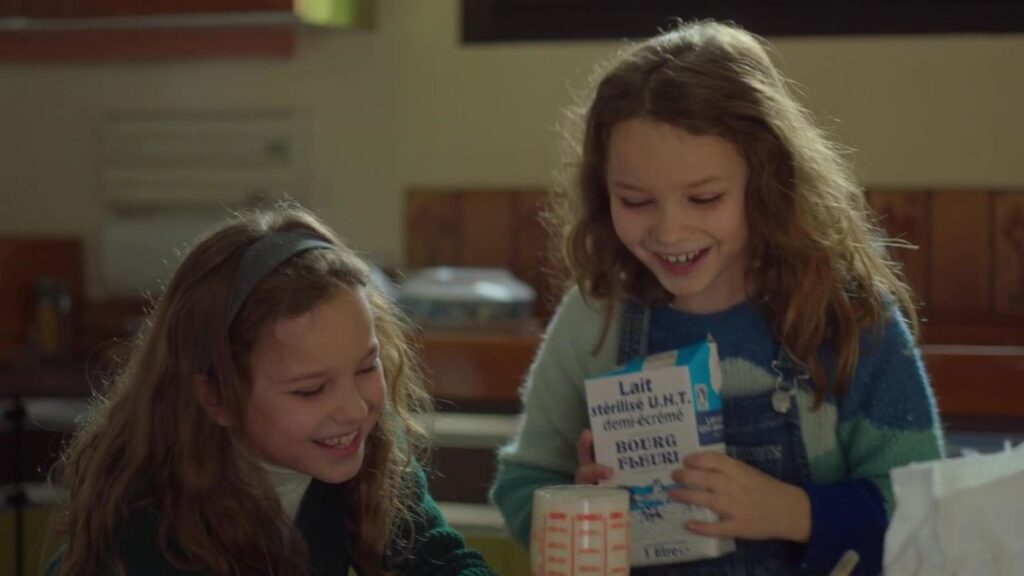Autumn in its full glory is celebrated to the fullest in Petite Maman. It is a charming, delightful film from renowned French filmmaker Céline Sciamma (following Portrait of a Lady on Fire) that excels in its simplicity. But equally tackles profound subjects. Such as grief and depression from a coming of age lens of childhood innocence tinged with magical realism.
Sciamma has teamed up with Claire Mathon once more for the cinematography. And they produce a naturalistic, warm and beautiful portrait from the perspective of the young girl, Nelly, whilst her family transitions after the death of her grandmother. Petite Maman exudes a gracefulness from the onset in its introduction to Nelly. As she wanders through a care facility saying goodbye to the residents. There are no lengthy explanations or patronising attempts to rationalise any emotions that she may encounter at that moment. As such, on first glance, the scenario appears to be joyful with an intimacy between Nelly and the other elderly residents.
However, a few phrases uttered, when Nelly returns to the room in which her mother is located, reveal that this moment differs to the casual goodbyes that we often deliver at the end of our interactions with others. Nelly’s goodbyes are final. Sciamma’s masterful direction ensures that there is only a subtleness revealing the extent of the goodbye uttered by Nelly. As there are personal belongings to be claimed such as a cane belonging to a relative (Nelly’s grandmother, as we later learn). Which is expressed with simple words but carries a weight of emotion combined with glances to the world outside that amplify that sensation of loss for Nelly and her mother. There is a sense of mystery in the initial moments to draw audiences further into Nelly’s world.
Petite Maman’s charm and beauty lie in that delicate treatment of a substantial moment in life. The film chooses to portray the uncertainty and loneliness from Nelly’s eye level, as the camera’s gaze is from her height. As such, we explore vicariously a new environ with Nelly. As the family inevitably have to re-arrange Nelly’s grandmother’s possessions at her home.
With a sombre procession to the home, Sciamma still manages to hypnotise us all with the beautiful mother-child bond. Often via simple gestures, like within the car as Nelly feeds her mother and provides her with juice from behind the driver’s seat. We are just privy to views of her hands performing such activities. Which finally envelop her mother in a hug – so simple, but so touching. These moments just illustrate how impactful Sciamma is and a master of her craft in highlighting such emotions without labouring the point.
Watching Nelly run through the woods is joyful. And inevitably creates a wistful longing for those moments of unbridled childhood freedom and days of make believe games and hiding under a duvet to avoid ghostly shadows at night. Sciamma embraces us within Nelly’s world extremely effectively. So much so that we are able to become immersed within the fairytale fully, and suspend our disbelief when Nelly is transfixed by a young girl building a tree house, who resembles her in many ways.
At just 72 minutes in runtime, Sciamma enchants us fully within this rich Autumnal childhood fantasy. Which does not need to be scrutinised and therefore invites us to re-connect with our inner child. Indeed, it is delightful watching two eight year old girls attempt to make pancakes and wrestle with heavy frying pans. But also to be working together finding suitable tree logs for the tree house. The performance from the young girls is impressive and seems magical.
Whilst the adults are on the periphery, the younger girls are the centre point of this story. Which also subtly tackles subjects such as depression during periods of mourning. The film is so naturalistic, in its approach to such themes, that aside from piano chords during the title credits there is no music throughout the film.
We are therefore absorbed fully in the antics of these young girls and might even envy their level of freedom. Indeed, there is the magnificent scene, if you know, you know. Representing unbridled freedom for the girls away from the woods there is the triumphant, iconic choral music from the future which bursts to life.
Petite Maman is an excellent, affecting film. It encourages us not to ignore that inner child and to re-visit all of those joyful, as well as painful, occasions within our childhood. Equally, there is that implicit commentary within the film about reflecting and accepting grief and loss within the circle of life. Overall, it is a delightful tale of discovery and fantasy integrated with beautiful cinematography. Sciamma has not missed again with this compelling tale, which is designed to be re-watched many times and will inevitably provide a warm glow for its audiences.

